E-Learning App Testing Services – A Key to Flawless E-Learning Apps
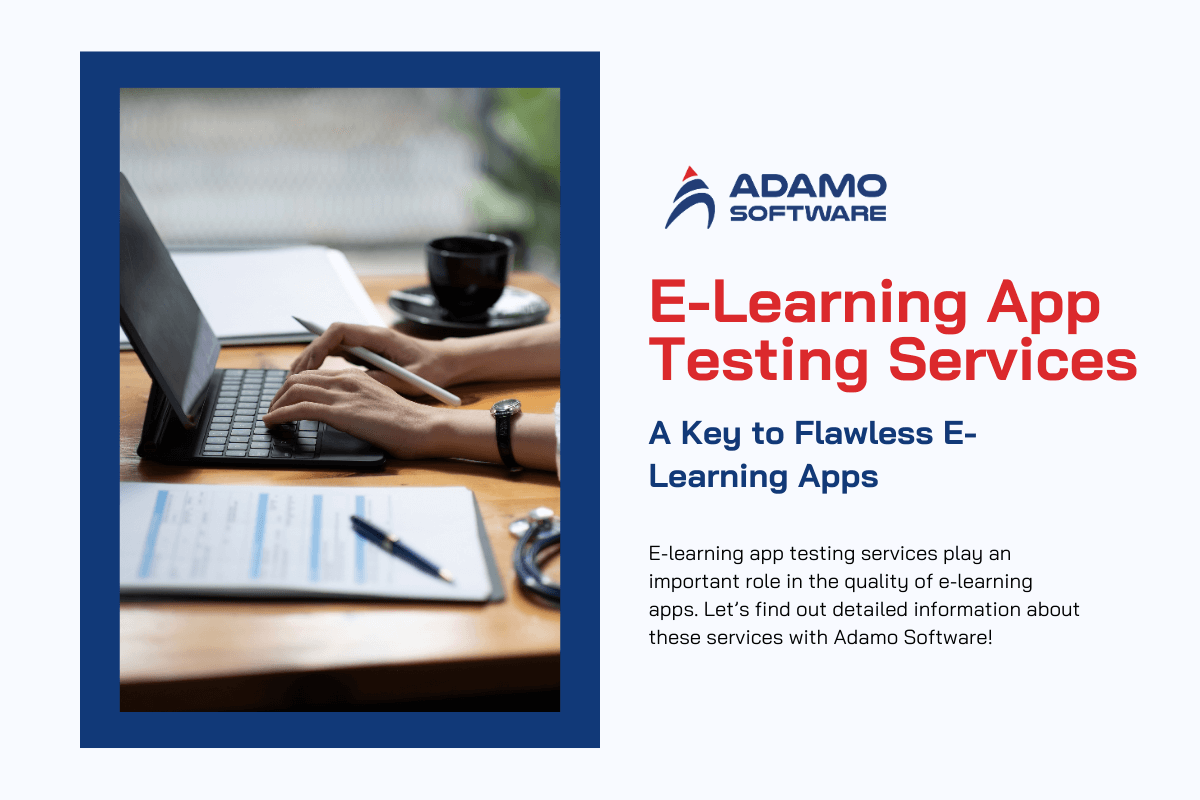
In today’s digital age, online learning is becoming more popular and necessary. Thus, educational institutions and businesses may want a stable and secure application to meet learners’ needs. E-learning app testing services which play an important role in the quality and efficiency of e-learning apps, will help them with this. Through these services, app developers can detect technical errors early. Besides, user experience can be enhanced.
Through this blog post, you will find detailed information about the e-learning app testing services. In addition, key factors to test in an e-learning app are also discussed, which include functionality, performance, security, usability, and compatibility. Besides, you will find the challenges in online learning app testing and how to test an e-learning app. This blog post also mentions why educational institutions and businesses need an e-learning app service.
By comprehensive testing, the e-learning app testing services can meet user expectations, whether they are students or instructors. Thanks to that, educational institutions can focus on delivering knowledge without worrying about technical issues. Refer to our blog post for more detailed, well-researched, and up-to-date information.
I. What is e-Learning App Testing?
Before going into detail about the e-learning app testing services, you may want to know what an e-learning app is. An E-learning app, or online learning or training app, is an app that enables communication between instructors, teachers, and their students. They can interact and exchange documents and lesson plans with each other via the Internet without having to meet in person. With an Internet connection, students can access learning materials through different devices. E-learning app testing services help to ensure that your app runs smoothly when it is officially launched.
E-learning app testing is a meticulous, multifaceted process to assess, analyze, and ensure the quality of e-learning platforms. App developers may want to use e-learning app testing services to detect if the app has any errors. Besides, these services also contribute to maximizing user experience and the app’s performance.
The testing process involves validating feature functionality, assessing application efficiency, and confirming security protocols. In addition, to guarantee seamless user accessibility and operation, app developers can also test compatibility across diverse devices and platforms.
II. Key Factors to Test in an e-Learning App
Before officially launching your e-learning app, you may want to test many aspects. They include functional testing, performance testing, security testing, usability testing, and compatibility testing. These tests ensure that your app works efficiently, and securely, and provides a good user experience. Let Adamo Software discuss these key factors in more detail.
1. Functional testing
Functional testing is one of the fundamental tests in e-learning app testing services. It includes testing these functions below.
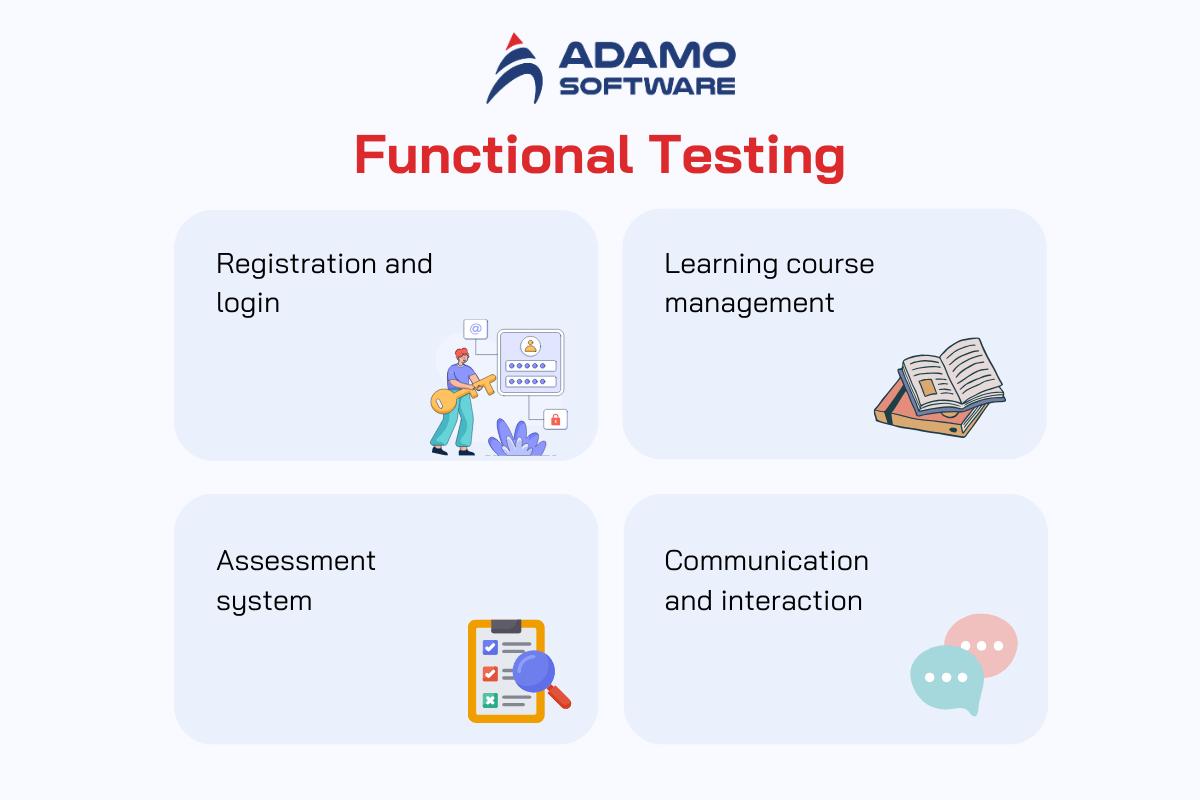
- Registration and login
Registration and login testing ensure users can easily create and access their accounts. This process includes checking input requests like name, Email, and password. This ensures that all user information is entered in the correct format and complies with security rules. Testing the function for two-factor authentication or strong password requirements is an example. You may want to test Email or phone number authentication to ensure the accuracy of user information.
- Learning course management
E-learning app testing services help to test the learning course management function. This function includes creating, editing, assigning lectures and course materials, and managing learning content. Lecture, exercise, and learning material assignment functionality must be thoroughly tested to ensure these resources are delivered to the correct user and displayed correctly.
Besides, student management features should also be carefully tested for accurate and timely information. Such features encompass progress monitoring, evaluations, instructor feedback, and more.
Overall, learning course management testing ensures all users can use the e-learning app smoothly and effectively.
- Assessment system
The assessment system testing in e-learning app testing services is essential to ensure that tests, assignments, and grading processes operate accurately and reliably. These tests confirm accurate file format handling, timely error responses, and swift marking with feedback for students.
- Communication and interaction
The communication and interaction functions also need to be tested. Through this test, you can ensure the smooth operation of messaging, forums, and other communication between instructors and learners. E-learning app testing services will validate direct messaging, test discussion thread creation and management. In addition, these services can also assess the effectiveness of different communication methods.
2. Performance testing
E-learning app testing services also include performance testing. If you want to evaluate your e-learning app’s ability to deal with a large database and workload, you will need this testing. Besides, with this test, you will also know if your app responds to user requests stably and efficiently. Let Adamo discuss more detailed information about this testing.
- Testing your app’s loading time
Your e-learning app’s loading speed can determine whether your users will keep using your app or not. Your users may lose interest or feel discomfort if your app runs too slowly. Therefore, testing your app’s loading time is needed. Large video files, PDFs, or images can take a long time to load. So, your responsibility is to focus on these files.
- Response time testing
Response time testing is also a part of the performance testing. This test aims to optimize performance and enhance user experience. The tests can evaluate the time your app needs to respond to user requirements. Thanks to that evaluation, you can ensure the efficiency of tasks like logging in, submitting tests, or retrieving data.
- High-load testing
E-learning app testing services may include high-load testing for your app. It determines an e-learning app’s capacity to handle peak usage and stimulates heavy user traffic and complex data loads to identify the app’s performance and system stability.
Through comprehensive performance testing, e-learning apps can ensure service quality, meet diverse user needs, and operate stably under all conditions.
3. Security testing
To protect your app and user data, you should use security testing in E-learning app testing services. The increasing threats from cyber-attacks make security a core factor in the development and operation of E-learning applications. Security testing focuses on detecting, assessing, and remediating vulnerabilities. Below are some important factors in security testing.
- Authentication and authorization verification
- Data protection testing
- Vulnerability identification
- Compliance evaluation
In general, by combining these security tests, you can build trust and ensure safety for your users. They can help your e-learning app protect user data from external threats. Besides, with these tests, your e-learning app can meet security standards and regulatory requirements, such as GDPR or HIPAA.
4. Usability testing
Usability testing is also included in the e-learning app testing services. This aims to evaluate and optimize user experience, ensuring that the app’s interface is user-friendly for all users. This process focuses on UX and UI testing to help users navigate, interact, and complete learning tasks conveniently and efficiently.
UI testing includes evaluating layout, colors, fonts, icons, etc. The interface must be clear, and attractive, allowing users to quickly find what they need without difficulty. Whereas UX testing focuses on understanding the way users interact with the app. This process often involves conducting tests with real users and gathering feedback on their convenience, speed, and satisfaction with using the app.
5. Compatibility testing
Compatibility testing in e-learning app testing services ensures that your app can be compatible with different devices and platforms. Browser compatibility testing is an important aspect of compatibility testing. This includes testing the app’s appearance, performance, and functions on each browser. It aims to ensure that there are no errors or problems when users access the application from any browser.
UI and UX for all devices can be optimized through mobile compatibility testing. Check if your app is suitable for use on iOS, Android, or both.
Overall, ensuring these testing elements helps your app meet the needs of users. Besides, you can provide effective and secure online experiences.
III. Challenges in Online Learning App Testing
Online learning app testing is a complex process that faces many challenges. Let Adamo Software discuss in more detail the difficulties that e-learning app testing service providers must deal with.
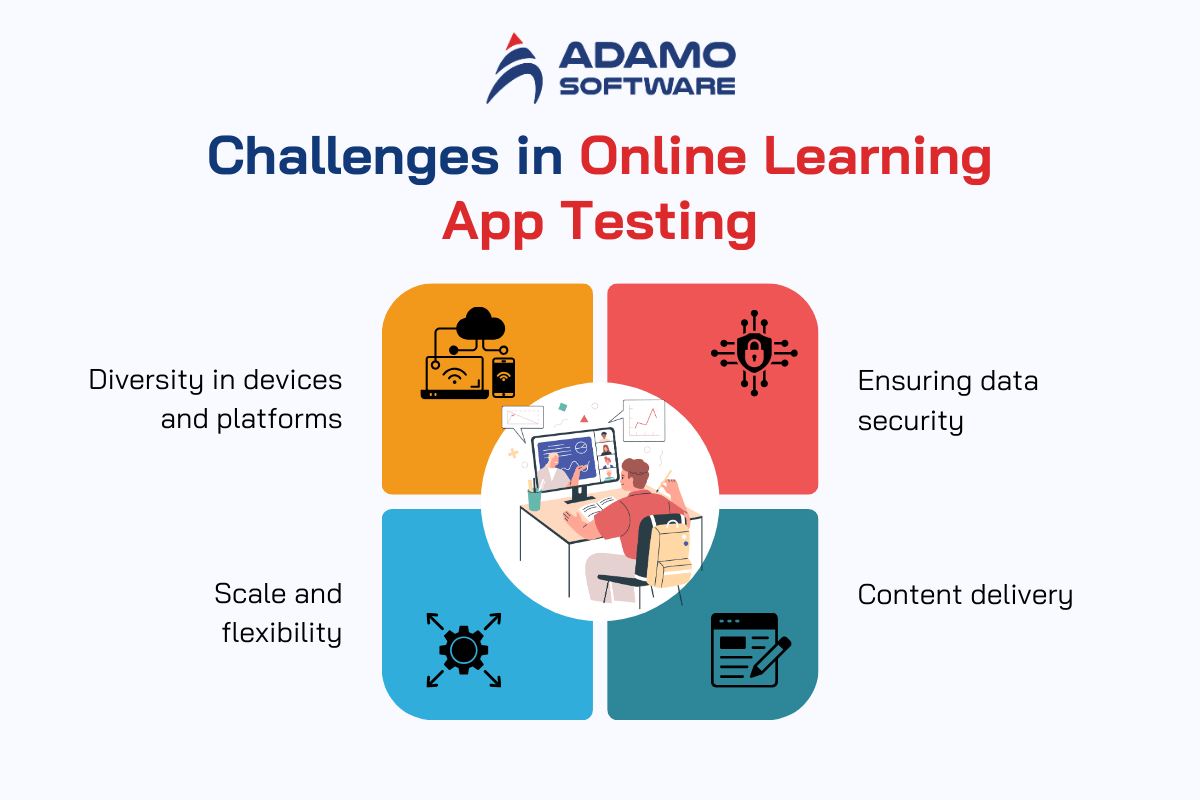
1. Diversity in devices and platforms
The diversity of platforms and devices is one of the challenges for e-learning app testing services. Your e-learning app must be smoothly used on different operating systems, devices, and browsers so that it can attract new users and retain existing ones
Each operating system has its way of managing material and display. This means that an app can work well on one platform but has problems on another, which requires you to test the compatibility of all operating systems.
Users can access your app through high-performance desktops to low-end mobile devices. Therefore, if you do not test your app’s performance on each device, your app will lose user engagement. User experience will be affected, especially when your app needs to deal with streaming high-quality video, running interactive tests, or managing large data.
To deal with the challenge of diverse platforms and devices, you may want to have a multi-platform testing strategy. This helps ensure that the e-learning application can provide the best user experience on any platform and device the user chooses.
2. Ensuring data security
Your users store and share their personal and important data on your applications. As a result, your e-learning app must handle large amounts of personal data and sensitive information, such as students’ personal information, assignments, and academic results. Taking measures to ensure data privacy and security; therefore, is extremely essential. Data encryption in transit and storage is fairly complex to implement properly.
E-learning apps can be the target of many types of cyber-attacks. For example, you should care about SQL injection, Cross-Site Scripting (XSS), Cross-Site Request Forgery (CSRF), and Denial of Service (DDoS) attacks, etc. These attacks can lead to data leakage, system takeovers, or service disruptions.
3. Scale and flexibility
Scale and flexibility are one of the most complex factors that e-learning app testing services face. Your app may have to support a large number of users, especially in situations like online exams or live classes with large numbers of participants.
E-learning app testing services need to test system scalability, ensuring that resources such as servers and databases can be flexibly adjusted to meet sudden increases in demand without disrupting service. Big data management is also a challenge that you have to face.
4. Content delivery
Content is the core of development for your e-learning app. Thus, delivering content becomes a difficulty for e-learning app testing services. Ensuring that learning content is delivered effectively and consistently to all users is extremely important.
Learning content in e-learning applications can include text, video, audio, and interactive materials. Ensuring that all types of content display and function properly across all devices and platforms is a major challenge.
Overall, education and e-learning apps face different obstacles in delivering exceptional user experiences and gaining a competitive edge. You may want to deal with these challenges to optimize your app and enhance user experience.
IV. How to Test an e-Learning App
To test an e-learning app effectively, you may want to follow a clear and systematic process. This process includes understanding the requirements of the app, and testing and evaluating the final results. Below are the main steps to perform testing for your e-learning app.
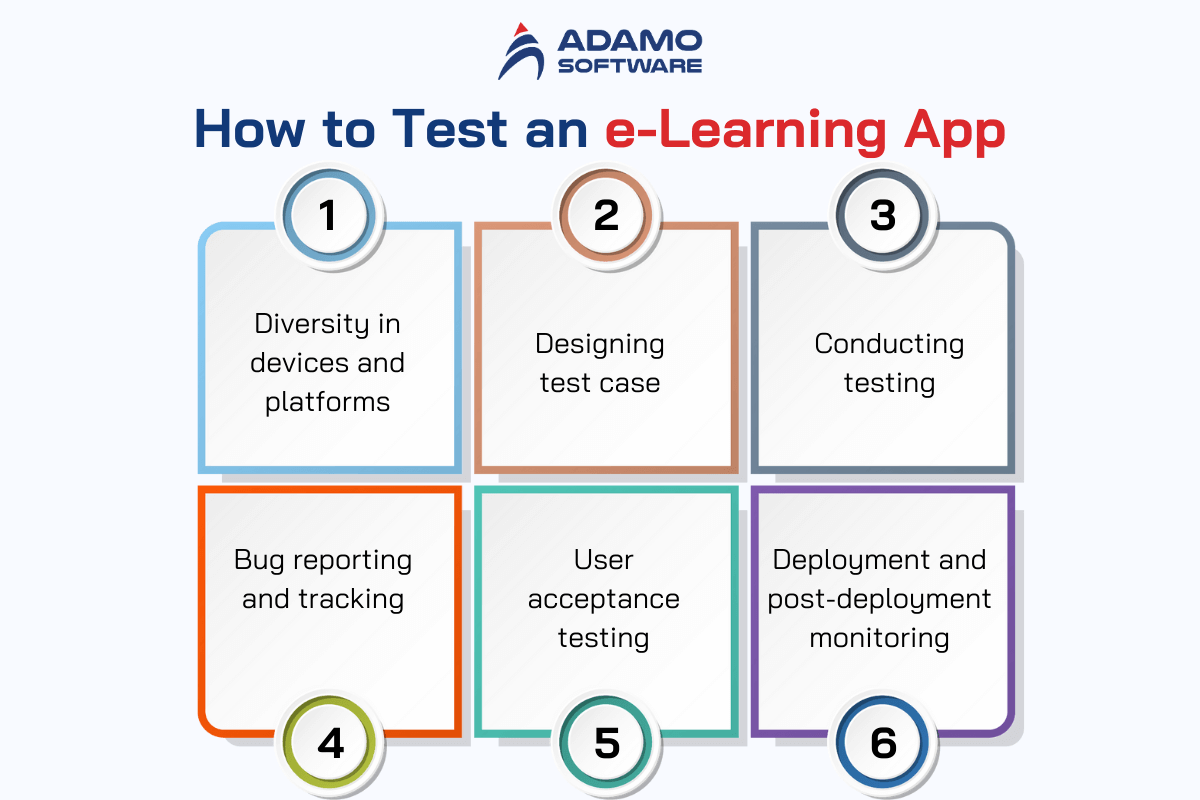
1. Analyzing requirements and planning
E-learning app testing services will start testing by analyzing requirements and planning. Before testing, you will have to understand the functional requirements of your app. In this step, you must grasp the core features of your app, such as login, course management, assessment system, and communication features.
When you have understood the requirements, it’s time for you to make a detailed test plan. This includes identifying the testing scope, creating a list of test cases, determining needed testing tools, and allocating necessary resources.
2. Designing test case
Test case design for e-learning app testing services is an important process. This aims to ensure all functions of the app work as expected. This step starts with identifying key test scenarios. These scenarios include new user registration, login and session management, and course browsing and registration. Besides, quiz and assignment completion and interaction and communication are also outstanding test cases.
After identifying the scenarios, it’s time for you to create specific test cases. For example, a test case can include checking if if a user enters an incorrect password, the application returns an appropriate error message.
3. Conducting testing
The test execution step in e-learning app testing services involves unit and integration testing. Let’s start testing with the smallest parts of the application, ensuring that each unit functions properly. This step helps to ensure that the small components of the application are bug-free before proceeding to integration testing.
After the unit testing, you may want to conduct the integration testing to guarantee a harmonious combination among different parts of your e-learning app. This helps to detect problems that occur when modules interact.
4. Bug reporting and tracking
Bug reporting and tracking is an essential step in your e-learning app testing process. This step helps you ensure that all errors are recorded, handled, and corrected effectively. Firstly, you will have to detect bugs in your app. E-learning app testing services help you record errors clearly and in detail. The bug report includes a bug description, ways to resolve the errors, and a test environment. After detecting the bug, you will come to the bug submission, bug tracking, retesting, and bug closure processes.
5. User acceptance testing (UAT)
Real users will be involved in the UAT process. You will collect their feedback to see if your app can meet the end user’s requirements and expectations. Besides, issues that previous testing steps may not have uncovered can be detected. Based on that, you can adjust and complete the application before official deployment.
6. Deployment and post-deployment monitoring
Once you have finished all the steps above, let’s proceed with application deployment. This step includes preparing the infrastructure, installing the application, and configuring the production environment. After the deployment, you must continuously monitor the application to ensure it operates stably and without errors in the production environment. Let’s use monitoring tools to track performance, security, and user behavior.
Also read: Comprehensive Guide to e Learning Mobile App Design 2024
V. Why You Need an e-Learning App Testing Service
Your e-learning app needs to meet feature requirements and provide a smooth, safe, and effective learning experience for users. That’s a reason why you need to use e-learning app testing services. Below are some benefits of these services.
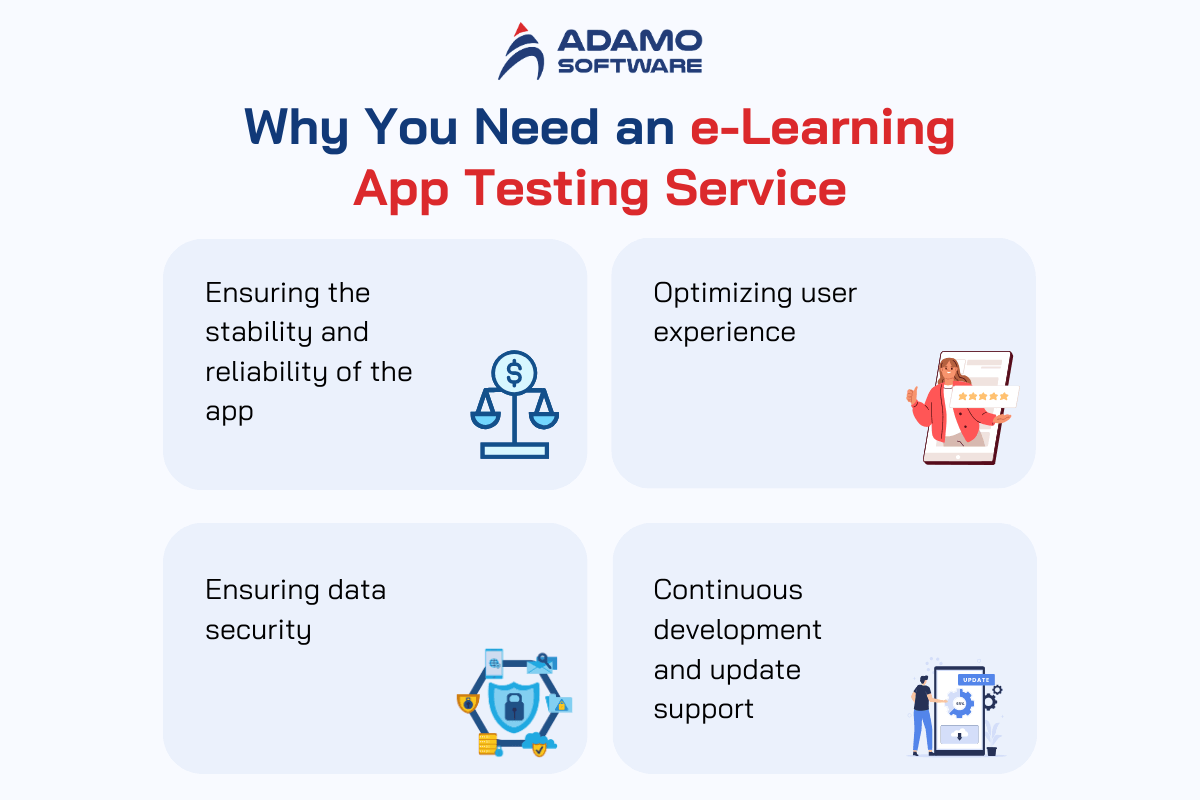
1. Ensuring the stability and reliability of the app
By adopting e-learning app testing services, you can understand any occurring problems, such as application crashes, slow response times, or system errors. These errors can disrupt the learning process and cause a loss of trust. Testing services will help fix these issues before the application is widely deployed. Once all bugs are fixed, your app can be smoothly used, no matter if your users are students, instructors, or administrators.
2. Optimizing user experience
User experience is the main factor deciding the success of your app. Usability testing from e-learning app testing services helps identify weaknesses in the user interface and interaction flow, thereby suggesting improvements. This helps ensure that users can easily access and use the application’s features without any difficulty.
3. Ensuring data security
When you use e-learning app testing services, you can trust their security features. Security is an indispensable factor, especially when cyber threats are increasing. The service will help to detect potential problems with data privacy and fix security vulnerabilities, ensuring that user data is protected.
4. Continuous development and update support
E-learning app testing services go beyond testing before the application goes live. It also includes ensuring that each update or new feature deployed does not impact the rest of the application, maintaining stability and performance.
Overall, investing in e-learning application testing services not only helps improve the quality and reliability of your product but also ensures that you deliver an optimal learning experience to your users. This increases user satisfaction and strengthens your position in the competitive online education market.
VI. Optimize Your E-Learning App with Adamo’s Expert Testing Service
When you want to test your e-learning app, Adamo Software can be your ideal choice. s one of Vietnam’s leading app development companies with experienced and professional experts, we are confident in delivering high-quality e-learning app testing services. Here’s how Adamo can help you.

- Comprehensive testing with no errors missed
- Optimizing user experience
- Ensuring user data security
- Cross-platform compatibility and performance testing
- Continuous and flexible support in every stage of development
- Save time and money with test automation
By using Adamo’s expert e-learning app testing services, you can be assured that your e-learning application will meet the highest standards of quality, security, and performance. Are you still hesitating about choosing a unit that can help you with your testing process? Let Adamo accompany you to deliver great and reliable online learning experiences to your users.





